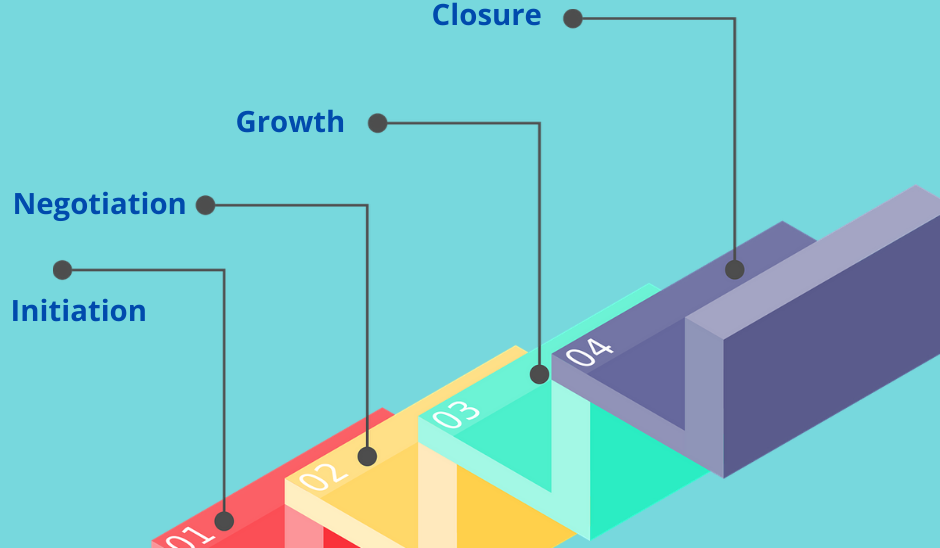
Establishing a positive mentor mentee relationship is very much like establishing any other human relationship. It requires both parties to have a genuine desire to understand the values and expectations of each other.
Mentee Relationship Stages
A mentor mentee mentoring relationship goes through four stages over the period of nine to twelve months:
- Initiation
- Negotiation
- Growth
- Closure
Each stage is equally important to make a relationship successful and should be treated with the same priority. While the time spent in each phase differs from relationship to relationship, the progression is uniform.
Also Read: 4 Characteristics of a quality mentoring match
Mentor Mentee Relationship Stage 1: Initiation
The first stage is a very important stage of a mentoring relationship. The mentor mentee get to know each other, see if they are the right match, and build the relationship. They informally discuss their common interests, values, future goals, and dreams.
Since the mentoring pair is new in the relationship, the first stage can be a bit challenging. There can be confusion, difficulty in communication, or even lack of communication. In many cases, mentees are reluctant to trust their mentors at this stage.
If this stage is not treated as a priority, the relationship can cut short because of miscommunication and misunderstanding.
Mentors play a vital role here to make the relationship work. Not only do they take the initiatives to communicate with the mentee, but also devote time to the relationship. They make sure the mentee feels comfortable with them. Further, they are responsible for building trust in the mentee.
Also Read: How to be a great virtual mentor?
Mentor Mentee Relationship Stage 2 Negotiation
The second stage is the business stage of a mentor-mentee relationship. It is the stage where a mentor helps the mentee set learning goals. They also agree on their initial expectations and define the strategy to achieve the target. Besides, they talk about when and how they will meet, what will be the frequency of their meeting and accountability.
Although mentors and mentees work on setting goals and creating a work plan, the negotiation stage is not quite simple. It involves talking about soft issues in a relationship, establishing ground rules, confidentiality, boundaries, and shared responsibilities. These are the topics that are often left out of conversations because they are not very easy to talk about. Yet, these are critical topics that need to be discussed.
If a mentoring pair is not compatible, negotiation is the stage where they can part their ways in a friendly manner.
Also read: Top 5 Mentoring Challenges and Their Solutions
Mentor Mentee Relationship Stage 3: Growth
 Once the trust is built and the expectations are discussed, a mentoring relationship enters into the 3rd stage- growth. At this stage, the mentoring partners start working towards the goals that were set. This stage offers the greatest opportunity for learning and development.
Once the trust is built and the expectations are discussed, a mentoring relationship enters into the 3rd stage- growth. At this stage, the mentoring partners start working towards the goals that were set. This stage offers the greatest opportunity for learning and development.
The mentor’s responsibilities at this stage are to help the mentee with various mentoring resources for their development. They help mentees overcome challenges; and gradually, a mentor becomes a guide, adviser, and friend to the mentee.
Another key responsibility of a mentor is to provide honest, candid, yet constructive feedback to the mentee. Because feedback is the most important part of a mentoring relationship. It allows mentors to acknowledge the mentee’s strengths and help them identify their weaknesses; which is crucial for mentees’ growth.
During this phase, both the partners monitor the learning process and progress to ensure the goals are being met.
Also Read: Why mentoring women in the workplace is more important than ever
Mentor Mentee Relationship Stage 4: Closure
At the fourth stage, the mentor mentee formally close their mentoring association. This can happen due to various reasons- the program is over, the goals are accomplished, needs become fulfilled, or something else. Still, this stage is more than simply marking an end to the relationship. It is an opportunity for the mentoring pair to recognize and celebrate their success.
Both mentor and mentee benefit from closure. It is an opportunity to harvest the learning and apply it in real-life situations.
Conclusion
Any mentoring relationship moves through these four phases. Yet, there is no specific formula to create a successful relationship. It takes effort from both partners to make it work. And if at any stage, the relationship experiences hardship, communication is the only solution.